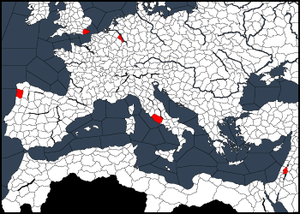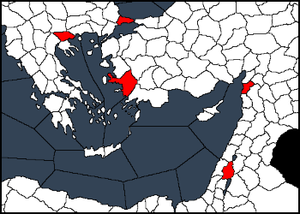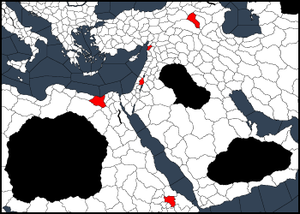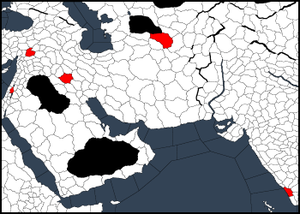基督教(英文:Christianity)是![]() 王国风云2 中六大宗教组之一, 并且是唯一一个不需要DLC就可以扮演的宗教组(尽管它的机制在
王国风云2 中六大宗教组之一, 并且是唯一一个不需要DLC就可以扮演的宗教组(尽管它的机制在 ![]() 亚伯拉罕之裔中被丰富)。
亚伯拉罕之裔中被丰富)。
作为亚伯拉罕宗教系中的第二个,基督教起源于拿撒勒的耶稣的教义。耶稣(Yeshua)是一个犹太人木匠以通常被以他的希腊化名字Jesus称呼,基督徒们相信他是上帝的儿子。尽管大约公元30年耶稣在犹太大祭司的要求下,被犹太人的罗马统治者庞蒂乌斯·彼拉多命令被钉十字架,但是他创建的信仰在公元313年由君士坦丁一世合法化后取代希腊多神教 作为罗马帝国的官方信仰。在王国风云2时间段内,基督教是西欧、中欧以及拜占庭帝国和东非的主流宗教,并且由于西亚异教徒皈依和西班牙收复失地运动,他的影响范围在后来的开局时间中扩大。
在王国风云2中基督教分为四个宗教:天主教、东正教、基督合性派、聂斯脱里派。
共同特点
对于所有基督教:
- 和犹太教一样,婚姻一般是一夫一妻制。基督教通常不具有任何形式的一夫多妻制,尽管基督教部落领主可以纳妾。
- 神殿被称作“教堂”,拥有者被称为“主教”。
- 通过授予人物修道院(与印度宗教相同)或要求宣誓来剥夺继承资格。
- 相比其他宗教传教能力更强,反映了基督教的福音传道。
- 特殊决议:
- 特殊特质效果
- 虔诚的角色有几率被列入真福或者封圣。(要求神圣之怒DLC)。宗教必须有宗教领袖(教宗,牧首等)
大多数基督徒都有宗教领袖,并有以下互动:
- 绝罚一个角色(花费100虔诚),使他们不被基督徒喜欢并且成为被绝罚的统治者宣战理由的目标。
- 离婚(花费100虔诚)
- 准许入侵CB,如果教皇不喜欢对方,你可以受批准对任何比你强大或者你拥有宣称的统治者发动此CB(100虔诚)。
宗教领袖对基督徒尤其重要,尽管他们信奉相同的宗教,但是由于潜在的对立教宗以及自治等因素,他们的宗教领袖可能并不相同。
 天主教
天主教
天主教是西欧主流宗教,在随后的开局时间,它向更东方传播,是游戏中最成功的宗教之一。
天主教是教会大分裂的主要制造者之一。在罗马教宗和君士坦丁堡的普世牧首长期激烈竞争后,在“中世纪盛期”剧本开始之前(1054年),他们互相绝罚对方,标志原来的尼西亚教会彻底分离。
天主教的宗教领袖是教宗,但游戏中同时存在多个对立教宗并不奇怪。
- Bishops who like the Pope (or Antipope) more than their secular liege will shirk their duties as vassals. They will pay taxes to the Pope (or Antipope) and provide levies to nobody.
 College of Cardinals, a special mechanism that determines how Popes are replaced
College of Cardinals, a special mechanism that determines how Popes are replaced- Investiture, a special crown law that determines how bishops are replaced
- Papal Investiture halves the piety cost of religious head interactions, at the cost of not being able to appoint successors to bishoprics
- Free Investiture improves vassal opinion, harms pope opinion, and allows appointing an antipope, as well as successors to bishoprics
- Numerous papal favors that rulers can request
- The only Christian denomination where crusades can be called against heretics and infidels. The Fraticelli heresy also features crusades if its religious head is created.
- Catholicism and its heresies become heresies of Orthodoxy when an Orthodox character mends the Great Schism. If this happens, crusades are disabled, even if Catholicism (or Fraticellism) becomes the mainstream.
- With
 Holy Fury, Catholic kings and emperors are highly encouraged to hold a Coronation ceremony to legitimize their rule.
Holy Fury, Catholic kings and emperors are highly encouraged to hold a Coronation ceremony to legitimize their rule.
Once the Crusades are unlocked, Catholicism gains more holy orders than any other religion in the game (up to five if their formation conditions are met). With ![]() Monks and Mystics, Catholicism gains two monastic orders, the Benedictines and the Dominicans.
Monks and Mystics, Catholicism gains two monastic orders, the Benedictines and the Dominicans.
Catholicism's holy sites are:
- Rome: The seat of the Pope and historical capital of the Western Roman Empire.
- Santiago: The site of the tomb of St. James the Great, one of the Twelve Apostles of Christ.
- Köln: The site of the Shrine of the Three Kings, a reliquary said to contain the bones of the three wise men from the East who visited the young Christ in the Gospels.
- Jerusalem: Holy to all Abrahamic faiths, Jerusalem is the historical seat of the Jewish faith and the site where Christ was executed and rose from the dead.
- Kent: The Archbishopric of Canterbury is of great importance in British Christianity from antiquity into the Renaissance. Among other things, it was the see of St. Thomas Becket, who was murdered by followers of King Henry II Plantagenet in 1170 AD (the infamous "turbulent priest" incident, emblematic of the tension between secular and clerical rulers in Catholicism).
Santiago and Jerusalem are under Muslim control in the early start dates, which makes Catholicism's moral authority rather vulnerable. In a 769 game in particular, due to the fact that Karl of West Francia often dies before forming Francia or the Holy Roman Empire, it's not uncommon to see Rome be captured by a Viking adventurer. This causes MA to plummet (-10 for losing the holy site and -5 for the Pope not controlling it). This in turn tends to result in heresy outbreaks across Western Europe, tearing its already relatively weak realms apart and making them easy prey for the Umayyads.
 异端
异端
- Fraticellism has identical mechanics to Catholicism, but the Fraticelli Pope (if created by a Fraticelli ruler who controls the county of Rome) is a duke-rank title. This means he may be vassalized by a mere king instead of only by an emperor as is the case with the Catholic Pope.
- Catharism does not have a religious head or crusades, but allows female bishops and absolute cognatic succession law and has no penalties for female rulers or heirs. Bishoprics are filled by absolute cognatic open elective.
- Lollardy and Waldensianism lack a religious head and crusades. Bishoprics are filled by agnatic open elective.
 东正教
东正教
Eastern Orthodoxy is the religion of the Byzantine Empire and several of its neighbors. In 1066, it is also the religion of the Rurikid rulers (Rus-Ruthenia region).
The Byzantine Empire is by far the most powerful Orthodox ruler in most start dates. However, its rule is often challenged by heresy (notably Iconoclasty in 769) and powerful Muslim rulers.
The religious head of Eastern Orthodoxy is the Ecumenical Patriarch, usually residing in Constantinople. However, he only has jurisdiction over characters and provinces not already under pentarchs and autocephalous patriarchs. Most of the time, the Ecumenical Patriarch is also the Pentarch of Constantinople, and a vassal of the Byzantine Empire.
- At game start, the only autocephalous religion with multiple kings
- The only religion with a dangerous heresy at any start date (Iconoclasm in 769)
- Mend the Great Schism to re-unite the Catholic and Orthodox religions if an Orthodox ruler owns Rome, Constantinople, Antioch, Jerusalem, and Alexandria as well as having the Ecumenical Patriarch as a vassal
- If the Byzantine Empire does not exist, it can only be created by Orthodox rulers
- The commander of the Varangian Guard will only convert to Orthodoxy (and not an Orthodox heresy)
The Orthodox faith gains a holy order, the Brotherhood of the Holy Sepulchre, if Antioch and Jerusalem are majority Orthodox and controlled by Orthodox characters. In ![]() Monks and Mystics, they also have a monastic order, the Community of St. Basil.
Monks and Mystics, they also have a monastic order, the Community of St. Basil.
Orthodoxy's holy sites are:
- Constantinople: The historical seat of the Ecumenical Patriarchate and Emperor Constantine's capital. Constantine is venerated as a saint by Orthodoxy and by Byzantine Catholics.
- Jerusalem
- Antioch: Referred to as the "Cradle of Christianity" and the place where the word "Christian" first emerged.
- Ephesus: An important center of early Christianity.
- Mount Athos: The heart of Eastern monasticism.
 异端
异端
- Iconoclasm is functionally identical to mainstream Orthodoxy, though an Iconoclast Byzantine Emperor cannot request that the commander of the Varangian Guard convert to it. In the 769 bookmark, the emperor follows this heresy and the Iconoclast Patriarch rules in place of the Ecumenical Patriarch. The Iconoclast Patriarchate does not exist in other starts.
- Bogomilism has no religious head nor autocephaly. It permits female bishops and has no penalties for female rulers or heirs, though not absolute cognatic succession law.
- Monothelitism and Paulicianism follow the same mechanics as mainstream Orthodoxy, but have their own always-existent patriarchs.
 基督合性派
基督合性派
Miaphysite Christianity, sometimes known as Oriental Orthodoxy or Coptic Christianity, is a religion that arose in opposition of the Council of Chalcedon's decision condemn and excommunicate Patriarch Dioscorus, While remaining in communion for several more years after the Council of Chalcedon the conflict that occurred after Rome attempted to impose several persecutors of Non-Chalcedonians and the Bishops of Egypt elected several rival Coptic popes lead to the Schism in following years . Once spreading across the Byzantine Empire's non-Greek land as well as the Kingdoms of Armenia, Nubia, and Abyssinia, its spread has been significantly hampered by the Islamic expansion and is in danger of being wiped out.
The religious head of Miaphysitism is the Coptic Pope. However, like the Ecumenical Patriarch, he only has jurisdiction over a relatively small amount of characters and land; more info here. The Coptic Pope is often also the Bishop of Alexandria, if it is controlled by Miaphysite lords.
- Autocephaly
- Relative minority religion, with most characters of the religion being independent counts and dukes in Eastern Africa, as well as some rulers in or near Armenia
Miaphysitism gains a holy order, the Order of Saint Anthony, if Alexandria, Makuria, and Axum are Miaphysite and owned by Miaphysite characters. With ![]() Monks and Mystics, it also has a monastic order, the Community of Saint Anthony.
Monks and Mystics, it also has a monastic order, the Community of Saint Anthony.
Miaphysitism's holy sites are:
- Alexandria: Historical seat of the Coptic Papacy. Pope Dioscorus I of Alexandria, who was deposed by the Council of Chalcedon, is recognized as the first Patriarch of the Coptic Church.
- Aksum: Location of the Church of Our Lady Mary of Zion where the Ark of the Covenant is kept.
- Antioch: Severus of Antioch was the last Patriarch of Antioch and is venerated as a saint in Miaphysitism.
- Jerusalem
- Dwin: Location of the Cathedral of Saint Grigor, the largest Christian church in Armenia at the time it was built.
- Alexandria, Antioch and Jerusalem are important

 Silk Road counties.
Silk Road counties.
- Alexandria, Antioch and Jerusalem are important
Miaphysitism's heresy Monophysitism ![]() is mechanically identical to the mainstream religion.
is mechanically identical to the mainstream religion.
 聂斯脱里派
聂斯脱里派
Nestorianism is a minority religion that arose in opposition of the Council of Ephesus and Council of Chalcedon's decision of Christ being "of two natures". The religion is in isolated areas near Baghdad and on Socotra in early starts in 1066. Nestorianism once was a significant influence in the Eastern world, with many adherents in Central Asia, including many Mongols, and spreading as far as China and India. However, it almost completely collapsed in the 14th century due to the destruction of Timur's conquests and Islamic and Ming dynasty persecution. There are few Nestorian starts and they will, as is somewhat historical, most likely be wiped out by expansionist Muslims or Mongols. There are also two horde Khagans that follow this faith themselves, those of the Golden Horde and Ilkhanate in 1255 and 1260 respectively; historically, this was most likely the basis for the myth of Prester John.
- Has a religious head: the Patriarch of the East
- Minority religion; has 23 provinces following the religion in 769 start date.
- Can intermarry Taoist, Bön, Buddhist, and all religions in the Zoroastrian group.
- Prior to 2.8 patch, the Nestorians used to have Autocephaly head system like the other non-Catholic Christian branches before reworked to have their own religious head system which is very similar to Papacy but without Papal succession mechanic.
A Nestorian ruler can form a holy order if he controls at least one holy site and Nestorianism has at least 50% Moral Authority. With ![]() Monks and Mystics, it has a monastic order, the Community of Saint Abraham.
Monks and Mystics, it has a monastic order, the Community of Saint Abraham.
Nestorianism's holy sites are:
- Edessa: Location of the School of Edessa and birthplace of Nestorianism.
- Baghdad: Seat of the Nestorian Patriarch from 775 to ~1310.
- Merv: Important metropolitan site between the 5th and 11th centuries. Merv's Christian community started from Christians deported from Roman territory at the beginning of the 5th century.
- Jerusalem
- Mahoyadapuram: Saint Thomas is traditionally believed to have arrived in this port in 52 AD and in the following years fouded several Christian communities in the area.
- Almost all Nestorian holy sites are important

 Silk Road counties, except Edessa.
Silk Road counties, except Edessa.
- Almost all Nestorian holy sites are important
Due to the typical lack of moral authority, it is relatively easy and harmless to convert from Nestorianism to its heresy.
 异端
异端
- Messalianism has the Divine marriage feature, permitting and encouraging marriages to one's own siblings, parents, or children. It lacks a religious head, and allows absolute cognatic succession and has no penalties for female rulers or heirs.



